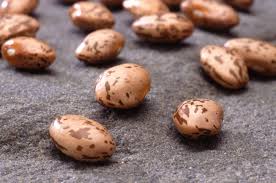Pinto Beans is a variety of the common bean (Phaseolus vulgaris). It is the most popular bean in the United States and northwestern Mexico, and is most often eaten whole in broth or mashed and refried. Either whole or mashed, it is a common filling for burritos.
Contents
Uses
- The pinto bean is the bean commonly used fresh or canned in many dishes, especially refried beans. It is popular in chili con carne, although kidney beans, black beans, and many others may be used in other locales.
- Pinto beans are found in Brazilian cuisine. Legumes, mainly the common bean, are a staple food everywhere in the country, cultivated since 3000 BC, along with starch-rich foods, such as rice, manioc, pasta, and other wheat-based products, polenta and other corn-based products, potatoes and yams.
- In the Southern United States, pinto beans were once a staple, especially during the winter months. Some organizations and churches in rural areas still sponsor “pinto bean suppers” for social gatherings and fund raisers.
Benefits
- May Slow Tumor Growth
Pinto beans contain antioxidants called polyphenols, which may prevent some forms of cancer, according to the American Journal of Clinical Nutrition. Pinto beans also contain kaempferol, which is a flavonoid known to help reduce inflammation. These beneficial antioxidants may slow the growth of tumors while increasing the survival rate of much-needed healthy cells.
- Reduce Heart Disease Risks
Pinto beans may be helpful in reducing cholesterol levels and therefore the risk for heart disease. By having about a half cup of pinto beans on a daily basis, studies published in the Journal of the American College of Nutritionshow that it can help reduce your total cholesterol and LDL cholesterol levels.
- Potentially Help Lower Risk of Breast Cancer
The American Academy of Pediatrics studied premenopausal women who were asked to complete a dietary questionnaire dating back to adolescent years. The study reveals that those women who had more total dietary fiber intake at an earlier age through adulthood were associated with significantly lower breast cancer risks, suggesting that a high-fiber diet during adolescence and early adulthood may be particularly important.
- Fight Diabetes
With the rise in obesity, diabetes is a growing concern. Pinto beans may offer some help, not only in reducing the risk, but in helping keep blood sugar levels in check. The complex carbohydrates that pinto beans contain are useful due to a slower digestion process. This can increase fullness and satiety and help regulate glucose and insulin levels. Additionally, the fiber they contain can help reduce the risk of metabolic syndrome, which affects glucose levels, making pinto beans the perfect addition to any diabetic diet plan.
Cautions
-
Intestinal Gas
Pinto beans may cause intestinal discomfort and gas. Beans naturally contain gas-causing substances and large amounts of fiber, both of which can lead to an increase in stomach cramping and flatulence. The Centers for Disease Control recommends soaking dried beans and changing the soaking water several times to cut back on the gas-causing properties found in pinto beans. Canned pinto beans tend to produce less intestinal gas than dried beans as well. Talk to your doctor about taking an over-the-counter enzyme tablet before eating pinto beans to help reduce stomach discomfort.
-
Increased Iodine Levels
If you suffer from thyroid cancer, your doctor may suggest that you avoid eating large amounts of pinto beans. Because thyroid cancer is treated with iodine radiation, avoid adding extra iodine to your diet during treatment. The Thyroid Cancer Survivors’ Association states that pinto beans are naturally high in iodine. Consuming excess iodine during thyroid cancer treatment can reduce the effectiveness of the radiation because your body may not use all of the administered iodine in the treatment if your iodine levels are already high.
Interactions
- n/a
Other names
- n/a
References
Source: Wikipedia, https://en.wikipedia.org/wiki/Pinto_bean
DrAxe, https://draxe.com/pinto-beans/
LiveStrong, https://www.livestrong.com/article/488491-side-effects-of-pinto-beans/

